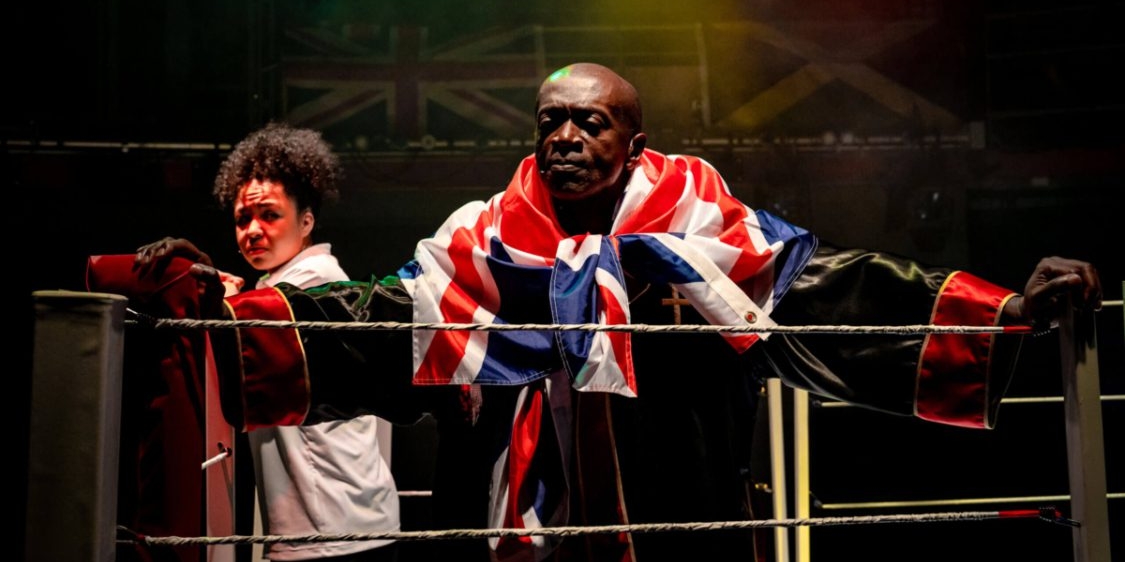I was expecting a play about British boxing, but this is a play about injustice. Namely, the gargantuan injustice visited upon Vernon ‘the Entertainer’ Vanriel, the lightweight boxing superstar of the early 1980s, the ‘Toast of Tottenham’, trapped in a Kafkaesque nightmare of Home Office bureaucracy, racism, and political intransigence.
Denied his return to the UK from Jamaica because he was away too long, but unable to claim public assistance in Jamaica because he hadn’t been there long enough, Vanriel is reduced to vagrancy, penury, and a spell on remand in a Jamaican gaol for allegedly setting fire to a derelict building.
The first half depicts Vanriel’s rise to be the UK number two in the lightweight division. From failing his exams, to discovering his talents as a boxer, to fighting at the Royal Albert Hall in front of thousands of adoring fans, Vernon ‘the Entertainer’ Vanriel’s triumph is nearly complete. He has the girls, the cars, the parties, the fame.
Then, in the second half we see the fall. Icarus-like he tumbles down the familiar staircase of drug addiction, depression, and self-sabotage. He is sectioned, loses his three cars and two homes, his partner and their children, and his last chance to have a shot at the title.
Escaping to Jamaica, the island of his birth, Vanriel finds love and respite from his demons, but also that his ‘indefinite’ leave to remain in the UK not so indefinite – denied a visa to come home to London, like so many others, by the Conservatives’ ‘hostile environment’.
What is remarkable about this sweeping production is that is staged in-the-round (as befits a tragic tale of Shakespearean measure) with just three actors, sustaining the narrative over two hours. The audience are spectators to a boxing ring, which doubles up a court room, dancehall, and prison. Director Anastasia Osei-Kuffour uses the confined dramatic space inventively and well.
Mensah Bediako, Amber James, and Ashley D Gale perform over 30 roles between them. Bediako is Vanriel throughout, from teenage contender onwards. But James and Gale perform the entire cast of characters with incredible versatility and skill – dancing, singing, and even scene-shifting.
Amber James in particular is unveiled as a luminous star, shifting effortlessly between playing the women in Vanriel’s life, to boxing commentator, police officer, court official, indifferent bureaucrat, and the Guardian’s Amelia Gentleman whose journalism helped to get Vanriel some degree of justice.
Amber James was just stand-out brilliant, with a singing voice worthy of the West End, and awesome dramatic versatility from Jamaican matriarch to David Lammy MP’s posh research assistant. Thespian grandee Don Warrington was in the audience, evidently enjoying the performance. If he can’t secure Amber James a leading role in Death in Paradise, we will all be missing out.
Dougie Blaxland’s mastery of words brings life to Vanriel’s story. The tale is told, in the tradition of Shakespeare, Ibsen, Goethe, and the earliest Greek tragedies, in verse, each syllable echoing and reverberating with the last, with more than a nod towards Amanda Gorman and Lin-Manuel Miranda. Blaxland’s wordsmithery propels you from one scene to the next with breathless economy and alacrity.
I said the play is carried by just a troika of actors, but that’s not quite true. There are walk-on roles for Bob Marley, Desmond Dekker, Kool and the Gang, Israel Vibration, Ryan Innes, Jimmy Cliffe, Lord Creator, and Labi Siffre, whose ‘(Something Inside) So Strong’ forms the heart-rending finale.
The rhythms and melodies of the Caribbean infuse On the Ropes in the same way it infused the life of Vernon Vanriel, from the blues parties and dancehalls of 1980s Tottenham and Hackney, in step with his beloved sister Blossom, to the walk-on music which he introduced to British boxing.
When not reciting thousands of rhymes, shadow boxing, shifting the set, and dancing, the cast have to sing too. That the actors managed, battling through various degrees of post-Christmas lurgy, is testament to their commitment to both their art and this remarkable story.
‘I wouldn’t want to be anywhere else’ says Vanriel in Act I about his north London home, with a massive dollop of dramatic irony. Yet the cruellest of systems denied him a home and livelihood for 14 years, alongside thousands of other victims of the Windrush Scandal. The play reaches its denouement, but for the real victims of Theresa May and Amber Rudd’s hostile environment, the tragedy goes on.

